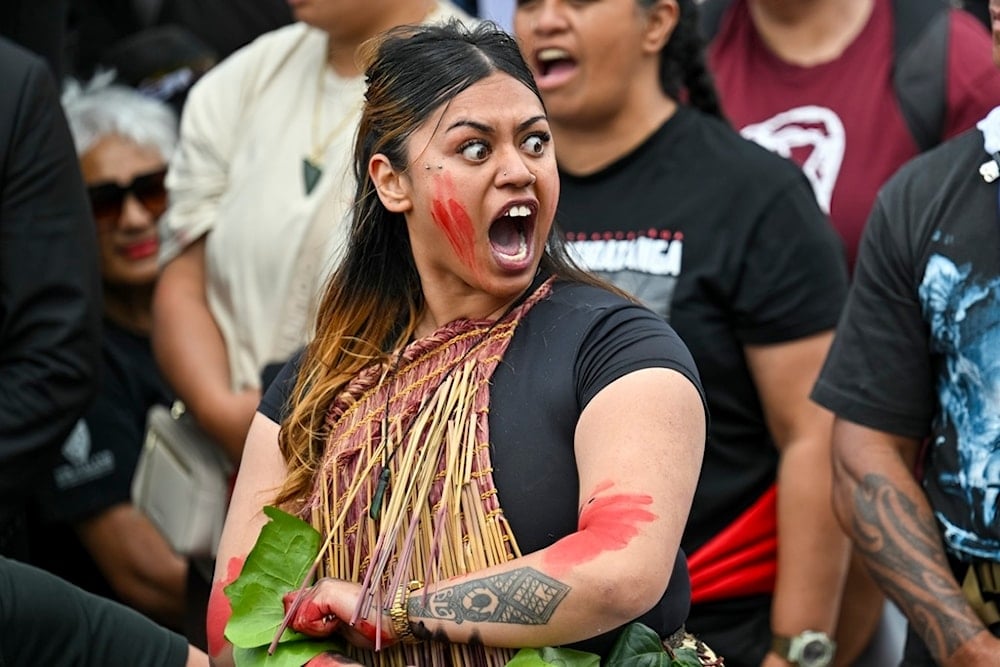New Zealand gov. halves Maori wards, sparks discrimination claims
New Zealand's right-wing coalition government has halved the number of Māori wards after forcing councils to hold public referenda on their existence.
-

Indigenous Māori react outside New Zealand's parliament to protest against a proposed law that would redefine the country's founding agreement between Indigenous Māori and the British Crown, in Wellington, New Zealand, Tuesday, Nov. 19, 2024 (AP)
New Zealand's Indigenous representation in local government has been significantly reduced after a nationwide series of referenda saw more than half of Māori wards voted out, following a law change introduced by the country's right-wing coalition government.
Māori wards, created in 2001 to ensure Indigenous voters could elect Māori representatives on local and regional councils, have long been a cornerstone of efforts to strengthen Indigenous political participation. Until recently, councils needed to hold public referendums before creating such wards, a requirement that made establishing them difficult.
In 2021, the Labour government removed that hurdle, allowing councils to set up Māori wards directly. However, in 2024, the coalition government led by Prime Minister Christopher Luxon reversed that reform, insisting that the public should decide on the matter. As a result, any council that had established Māori wards under Labour's rule was compelled to hold binding votes during the October 11 local elections.
Māori representation rollback
Of the 42 councils that held referenda, 17 opted to retain their Māori wards while 25 chose to dissolve them, effectively cutting the number of guaranteed Māori seats nationwide by more than half.
Local Government Minister Simon Watts welcomed the outcome, claiming the process reaffirmed democratic choice.
"These collective decisions reflect the democratic will of the local communities and provide a clear mandate on their preferred form of local representation," he told The Guardian. "It's a vital step in reinstating local democratic control."
Opposition lawmakers, however, denounced the move as discriminatory and a step backward for Māori representation. They argue that the government's decision to single out Māori wards for referenda, while other types of wards, such as rural ones, can still be established without a public vote, shows bias against Indigenous political rights.
Labour's acting local government spokesperson, Kieran McAnulty, called the process "a farce", saying many communities defied government expectations by voting to keep their Māori wards.
"Well, they failed. Many communities have given the government a middle finger response," he said. Political commentator Lara Greaves, an associate professor at Victoria University of Wellington, said the outcome was disheartening for those who had fought for greater Māori representation.
"It's a real shame for the Māori wards that had only just come in – they're only just starting to hit their stride," she said.
Deep divisions
The results also exposed a sharp urban-rural divide; six of the seven cities voted to keep Māori wards, while rural districts overwhelmingly opposed them.
This year's local elections recorded the lowest turnout in 36 years, with fewer than one in three voters participating, prompting calls for electoral reform.
Watch this incredible protest as the indigenous Maori MPs perform a haka to disrupt the vote on a bill that seeks to diminish their rights.
— Donna Miles دانا مجاب (@UnPressed) November 14, 2024
Imagine if Western politicians had the same courage to stand up to genocide and shame Israel in similar ways. pic.twitter.com/8GVyX0T5dE
Since taking office, the coalition government has rolled back several policies aimed at improving Māori health, education, and representation, arguing it wants to end what it calls "race-based" policies. Critics say those changes are eroding Māori rights and undermining the spirit of the Treaty of Waitangi, the country's founding agreement between Māori and the Crown.
The government maintains that its approach is about fairness and equality for all New Zealanders, but the debate over Māori wards has once again exposed deep divisions over race, democracy, and Indigenous representation in Aotearoa New Zealand.
Read more: New Zealand AG warns electoral reform may violate human rights law

 3 Min Read
3 Min Read










